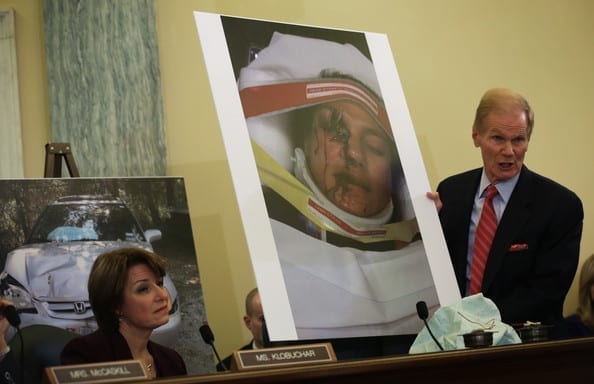6/23/2015
The Senate Commerce, Science, and Transportation Committee alternated flaying both Japanese airbag manufacturer Takata, and the U.S.’s top auto regulator, the National Highway Transportation Safety Administration (NHTSA) during a contentious hearing on Capitol Hill Tuesday. The hearing accompanies two separate reports that highlight extreme failings by both the manufacturer and the agency. The hearing began with Senator Bill Nelson’s (D-FL) introduction of graphic photos from constituent, Clarabel Nunez, including her bloody forehead, the blood-stained airbag, and a sharp piece of shrapnel that was inches from her neck and throat. “The bottom line is we need to get these cars fixed and we’ve been talking about this since last year,” said Nelson. The committee compiled over 13,000 emails and internal documents from Takata including, among other shocking details, that Takata actually suspended safety audits in 2009 for budgetary reasons, a year after the first Honda recall regarding the airbags. The report also cites that Takata knew about the airbag defects as early as 2001. Exploding shrapnel from the rapidly-inflated airbags have been attributed to over 100 injuries and 8 deaths, including a 26 year-old California woman killed last September, according to a recently-filed lawsuit.

Photo courtesy of Alex Wong, Getty Images
Much of the committee’s report revolves around quality-control failures at Takata’s two main manufacturing plants in Monclova, Mexico, where the airbags are manufactured, and Moses Lake, Washington, where the propellant that has been blamed for the aggressive deployment of the airbags is made. The report cites a series of damning communications between Takata employees. One such communication involved emails between a supervisor at the Monclova plant discussing the issue with a quality control engineer, writing about the airbag’s inflators in 2011, “We cannot be faced with findings / defects of this sort and NOT do ANYTHING. A part that is not welded = one life less, which shows we are not fulfilling the mission.” The engineer replied, “We are in a very critical situation because of the most recent problems that we have detected on the line. Situations like this can give rise to a recall.”
Although Takata did appear to reinstate the safety audits in 2011, the safety directors noticed major lapses in protocol inside the plants, and according to emails, maintained an effort to hide the findings from the corporate offices in Tokyo. The communications indicate that the propellant was often left on the Monclova plant’s assembly-line floor, despite warnings from Tokyo that doing so could expose the propellant to moisture. It is believed that humidity and moisture corrode the propellant, causing the defect to occur, however, the report cites that this information was kept hidden from the Tokyo office. A follow-up audit, months later revealed that employees rushed to create the appearance of a safety committee. “No safety committee, as such, has been formed,” wrote a safety superintendent, receiving a reply from a quality manager, “We need compelling responses and evidence so that there is no doubt and they don’t start asking for this and that.” For their part, Takata representatives claim that many of the internal communications the report cited were taken out of context and that Takata never stopped monitoring the quality of the manufacturing processes in the plants.
The committee’s report divided the blame between Takata and the NHTSA, concluding that, “Similarly, had NHTSA promptly undertaken more aggressive steps to investigate the Takata airbag ruptures, it is possible that this defect could have been addressed years earlier.” The conclusion accompanies Monday’s scathing Inspector General’s report that called the NHTSA a systemic failure. Both reports cite longtime failures to identify defects by the agency and insufficient personnel to handle the nearly 80,000 annual consumer complaints. NHTSA Administrator, Mark Rosekind, who was recently appointed last December, has enthusiastically agreed to implement the 17 major reforms that the Inspector General recommended by the June, 2016 deadline. Rosekind took over after years of lax leadership from former director, David Strickland, who left in December, 2013 to become an auto industry lobbyist, and David Freidman, who Rosekind replaced. Freidman remains as the Deputy Administrator for the agency however. At the hearing, Rosekind acknowledged that a system-wide culture change was necessary, however citing that the agency operates on a $10.6 million annual budget that has not increased commensurate with inflation over the past 10 years. The agency operates with 60 employees in the Office of Defects Investigation (ODI), its main investigative unit. Both Rosekind and President Obama have lobbied congress to triple the NHTSA budget and hire 380 additional ODI workers.
Despite Rosekind’s aggressive pursuit of Takata, as well as with the General Motors ignition-switch recall, some in Congress believe the problems are too overwhelming even for Rosekind, who came to the NHTSA as the world’s leading expert in human fatigue. Senator John Thune criticized the early problems organizing the 33.8 million airbag recall, which both Rosekind and Transportation Secretary, Anthony Foxx called, “the most complex recall in auto history.” Committee member, John Thune (R-SD) believes that the lack of consolidated information, which has led to consumers receiving multiple recall notices over separate airbags in the same vehicle, stating at the hearing, “Recall fatigue and confusion are growing.” Democratic Missouri Senator, Claire McCaskill was less diplomatic about Rosekind’s plea for increased resources calling the Inspector Genral’s report the most damning she has ever seen regarding a government agency. She believes that increased funding should be denied until significant changes are made, saying “This isn’t about resources. This is about blatant incompetent management.” Thune concurred to a degree, saying “These issues cannot be solved just by throwing money at the department.”
Sources:
Bloomberg Business – Alan Levin
New York Times – Hiroko Tabuchi and Danielle Ivory
U.S. Senate Committee on Commerce, Science, and Transportation
Washington Post/AP – Marcy Gordon and Tom Krisher


Join the conversation!